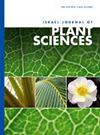Effects of auxin and urea derivatives on adventitious rooting in chestnut and oak microshoots
IF 0.9
4区 生物学
Q4 PLANT SCIENCES
引用次数: 5
Abstract
The present study investigated how auxin concentration and the method of application affected the formation of adventitious roots in microshoots of chestnut (Castanea sativa) and oak (Quercus robur). The activity of two urea derivatives (2, 3-MDPU and 3, 4-MDPU) was also evaluated. Microshoots were derived from basal sprouts of two mature chestnut trees (P1 and P2) and one adult oak genotype (Sainza). In chestnut, rooting percentage was positively affected by auxin in a dose -dependent manner, particularly in shoots treated with the hormone for 24 h. The effect of auxin on rooting also differed depending on the application method. In shoots treated for 24 h, the highest concentration of auxin produced the healthiest rooted plantlets, in terms of the root system and shoot quality. By contrast, in shoots treated by the basal quick-dip method, the shoot quality was best at the lowest auxin concentration. The effect of urea derivatives on the root system depended on the species as well as on the auxin concentration and application period. Use of the MDPUs improved the root system architecture of auxintreated shoots by promoting lateral root development and triggering the synchronous initiation of root primordia at the base of the shoot. Shoot quality was also improved by MDPUs, which promoted resumption of growth and reduced shoot-tip necrosis.生长素和尿素衍生物对栗树和橡树微芽不定根的影响
本研究探讨了生长素浓度和施用方法对栗(Castanea sativa)和栎(Quercus robur)微芽不定根形成的影响。还对两种尿素衍生物(2,3-MDPU和3,4-MDPU)的活性进行了评价。微芽来源于两个成熟栗树(P1和P2)和一个成年橡树基因型(Sainza)的基部芽。在栗子中,生长素以剂量依赖的方式对生根率产生积极影响,特别是在用生长素处理24小时的枝条中。生长素对生根的影响也因施用方法而异。在处理24小时的芽中,就根系和芽质量而言,最高浓度的生长素产生了最健康的生根植株。相反,在用基础快速浸渍法处理的枝条中,生长素浓度最低时枝条质量最好。尿素衍生物对根系的影响取决于品种、生长素浓度和施用期。MDPU的使用通过促进侧根发育和触发芽基部根原基的同步启动,改善了辅助处理芽的根系结构。MDPUs还提高了芽的质量,促进了生长的恢复,减少了茎尖坏死。
本文章由计算机程序翻译,如有差异,请以英文原文为准。
求助全文
约1分钟内获得全文
求助全文
来源期刊

Israel Journal of Plant Sciences
生物-植物科学
CiteScore
1.90
自引率
0.00%
发文量
17
审稿时长
>12 weeks
期刊介绍:
The Israel Journal of Plant Sciences is an international journal of extensive scope that publishes special issues dealing with all aspects of plant sciences, including but not limited to: physiology, cell biology, development, botany, genetic
 求助内容:
求助内容: 应助结果提醒方式:
应助结果提醒方式:


